
The Books That Help Beth Macy Find Threads of Hope While Writing About Trauma
A Reading List for Alleviating Panic in the Face of Secondary Trauma
When my third book, Dopesick, came out in 2018, I found myself in the place of promoting a book at the same time I was grieving the recent murder of 28-year-old Tess Henry, a main protagonist of that book. I’d been following her story for more than two years when her mom phoned to say that her battered body had been discovered at the bottom of a dumpster on Christmas Eve.
“Secondary trauma” is what psychologists call all the not-sleeping, overeating, and not-relaxing I experienced after spending years writing about trauma. I felt so bereft in 2018 that a minister friend of mine felt the need to kindly point out: “Not everyone is a heroin user, Beth.” And while I knew that he was right, as overdose deaths soared during COVID-19, I felt more hopeless than ever.
Beyond basic mental help health and daily exercise, I wasn’t quite sure how to deal—and my grief was nothing compared to the pain now experienced by more than one million families who’ve lost addicted loved ones, or the one million families who’ve lost relatives due to COVID.
Through the help of friends and doctors, I developed strategies for getting out of my panicky funk. I also started hauling around a handful of well-worn books to book events. Eventually, I went from being someone who was never going to write about addiction again to someone who, four years later, has a follow-up book, called Raising Lazarus: Hope, Justice, and the Future of America’s Overdose Crisis.
Today, more than a third of American families now wrestle with the fallout of the worst drug epidemic in American history—compounded by climate change, the end of Roe, the war in Ukraine, and our imperiled democracy. There are days when it feels as if the entire country is on the verge of having secondary, if not primary, trauma.
So here’s my list of funk-lessening, personally lifesaving books for what’s ailing you. You don’t have to be an EMT or an Appalachian Buddhist to garner insights from them. You just have to stay focused on the fragile threads of hope, anchor in the present, and put what good you can out into the world.
*
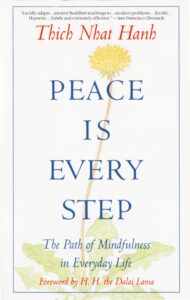
Thich Nhat Hanh, Peace Is Every Step
I was passing through Portland, Maine, when my sister-in-law, a nurse practitioner, tucked her copy of Thich Nhat Hanh’s Peace Is Every Step, into my suitcase. For a solid year, I carried her already dog-eared collection of mindfulness strategies from city to city, dipping into it randomly at night, finding a gem on every digestible page. Published in 1992, the book contains mindfulness strategies that are as timeless as they are essential, full of gentle and loving reminders to take advantage of every mundane-seeming moment.
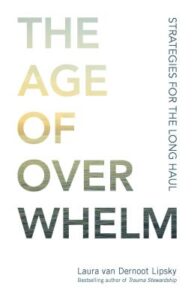
Laura van Dernoot Lipsky, The Age of Overwhelm
Laura van Dernoot Lipsky’s The Age of Overwhelm literally landed on my doorstep while I was mid-book tour for Dopesick. When I reached out to thank her for sending it via my publisher, she said she’d happened to have heard an interview segment with me on NPR and “had a feeling” the book might be of service.
That book and her follow-up, Trauma Stewardship, are essential guides for anyone experiencing secondary trauma. (I also recommend her excellent podcast, Future Tripping.) A pioneer in the field of trauma exposure who consults with first responders and others who work in the helping professions, Lipsky has compiled the best techniques for mitigating harm, cultivating decency, busting out of unhealthy ruts and moving beyond operating in survival mode—beyond just pouring ourselves a cold IPA at the end of the day.
Reading her books is like sitting down with the best counselor, someone who’s down-to-earth and as funny as she is profound. Her books teem with practical advice, from protecting your mornings to working up a daily sweat (daily, religiously even) to minimizing your impulses. She’s the ultimate quote curator, too, like this nugget from the great James Baldwin: “We’ve got to be as clear-headed about human beings as possible, because we are still each other’s only hope.”
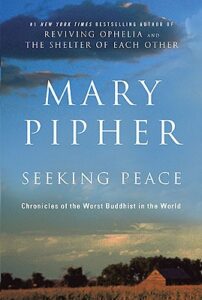
Mary Pipher, Seeking Peace: Chronicles of the Worst Buddhist in the World
Similarly, Mary Pipher’s Seeking Peace: Chronicles of the Worst Buddhist in the World was another one that I have intermittently toted around on reporting trips, including into several hotel bathtubs (judging from its now-crinkled pages). A psychotherapist who wrote the groundbreaking Reviving Ophelia, Pipher uses her own story to recount her post-Ophelia meltdown and her complicated journey to a quieter life, from how to pray to the thorny trick of accepting love from others while also extending it to yourself.
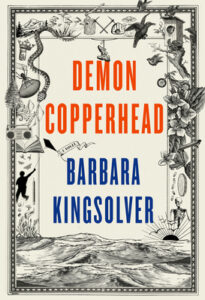
Barbara Kingsolver, Demon Copperhead
Self-help aside, it’s moving fiction that I most crave at times like these. Specifically, it’s the novels that immerse me into hella-good stories that are most apt to slow my type-A impulses. My favorites worm me sideways into the heart of an issue, the way Jennifer Haigh’s Mercy Street built itself around a Boston abortion clinic, illuminating the inner workings of that all-too-politicized space in surprising ways and in intimate detail.
Right now, I’m inhaling an advanced reading copy of Barbara Kingsolver’s (out Oct. 18), which is loosely set against the backdrop of Lee County, Virginia, the same community where much of Dopesick (the book and the Hulu show) was set.
From the very first sentence—“First, I got myself born”—you know that her Damon-cum-Demon is a character for the ages, on a par with Huck Finn and Holden Caulfield, but with way less privilege and way more pluck. The voice of the eponymous main character, a poor kid poor born to a single mom in a single-wide trailer, is that unique, that unparalleled, that page-devouringly fresh. I can hardly wait to finish it so I can go back and savor it anew.
_________________________________
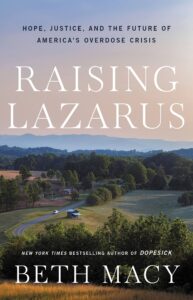
Raising Lazarus: Hope, Justice, and the Future of America’s Overdose Crisis by Beth Macy is available now via Little, Brown.
Beth Macy
Beth Macy has won more than two dozen national journalism awards, including a Nieman Fellowship for Journalism at Harvard University, a Guggenheim Fellowship, and a Los Angeles Times Book Prize for Dopesick, which was made into a Peabody Award-winning series for Hulu. Three of her books have been New York Times bestsellers. She lives in Roanoke, Virginia.



















